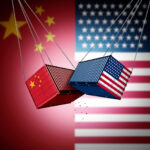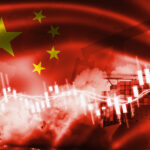(Oil & Gas 360) – The United States is in a worldwide competition with China. Until recently, considerations of this competition focused on the possibility of a war between the US and China in the Taiwan Straits.

It is apparent a direct military confrontation in the Taiwan Straits is not in anyone’s best interest. This competition is about far more than Taiwan. The Trump Administration recognized it is a worldwide competition between two different political, social, and economic systems to decide what shall be the dominant “World Order” for the rest of the 21st century – and they completely changed the game.
Confronting China requires a campaign of deception, deflection, diversion, dismemberment, and degradation. The Trump Administration took the initiative with its current aggressive program of wholesale negotiations to re-organize the world trade system. This transformed the confrontation to an economic and financial competition from a possible military confrontation over Taiwan. The speed and methods of the Trump Administration allowed the US to define the contest. It was unexpected and put China on its back foot. China is not without its tools, however, and we can expect strong retaliation. Trump must keep the initiative by aggressively continuing to do the unexpected and do it fast.
China’s Belt and Road program over the past decade established active Chinese participation in many commercial activities in countries far from China. The Belt and Road project, resembles creeping tentacles reaching out from China. This structure is vulnerable to dismemberment where China cannot defend it. Blackrock’s acquisition of the extensive worldwide port system of Li Ka-Shing is a prime example of how this can be done. These ports are in strategic locations, the most well-known of which are the two ports at each end of the Panama Canal. These ports, many in Europe and the Middle East, will be changed from Chinese to American management without military conflict. BlackRock’s action is an example of the benefits of doing the unexpected. It also demonstrates the strengths and benefits of one of the United States’ greatest assets — its private enterprise companies and the people who work for them worldwide. The Chinese Belt and Road system can be derailed.
The southwest Pacific needs high priority US foreign policy attention. China has established relations with the Solomon Islands and is also attempting to conclude agreements with the Cook Islands and Vanuatu. These are countries with small populations and weak governments, but they share strategic locations across the Pacific. Strong Chinese presence in these areas would threaten shipping lanes east of Australia which link Australia with New Zealand, the US, Canada, and South America. This is the same strategy the Japanese tried to implement in World War II to isolate Australia. It was thwarted by US military forces deployed to New Guinea and Guadalcanal in the Solomons. China does not have a strong military presence in the area yet, however. Their efforts should be countered quickly, jointly with Australia.
Russia recently announced it was stationing fighter jets at an Indonesian airfield on Biak Island. This is an extremely disturbing event. Indonesia was a strong ally of the US under the Suharto government from the 1960s to the 1990s. Suharto came to power by defeating an attempted Communist takeover and was a fierce opponent of China. During the Asian financial crisis of 1998, the US not only failed to support Suharto, but actively supported his removal from power. Indonesia then endured an unstable period of frequent government changes but stabilized for the last four elections. Indonesia is the world’s fourth largest country by population and the largest Muslim country. It is rich in natural resources and is an island nation astride many of the world’s most active sea lanes. The US fought two wars in the twentieth century because of threats to Indonesia. For some unfathomable reason, however, in this century we either ignored it or aggravated its government. Many American companies have extensive operations and good relations in Indonesia. Re-stablishing good governmental relations with Jakarta should be an urgent and low-cost priority of our foreign policy.
The tariff negotiations, by their nature, are an excellent opportunity to re-align relationships with many countries. Such discussions can roll back much of China’s overseas presence.
China does not share one of our best advantages in this worldwide contest — the extensive network of American companies and people already operating worldwide. These companies have developed a range of familiarity, experience, and relationships globally over the years. The Trump Administration includes an extensive roster of people who worked in private enterprise, not least of which are the President and Vice President. This Administration is comfortable engaging with private sector organizations and people. In traditional Washington policy circles, private enterprise is viewed with suspicion, if considered at all.
I cannot emphasize enough the advantage the American private sector overseas gives us. American construction, equipment, mining, banking, and oil companies, for example, have extensive operations overseas and their employees must understand the country and have good local relations to be effective. This is especially true in some critical countries, such as in Latin America, with extensive American private sector operations, but seemingly on the sidelines of American foreign policy considerations.
I am writing this on Easter Sunday afternoon. This causes me to reflect that we are not just in an economic or business competition. We are in what Samuel P. Huntington predicted: a Clash of Civilizations.
On one side of this competition is a system in which man has no soul, exists only to serve the state, and is surveilled, oppressed, and controlled until his spirit is crushed and buried. On the other side is a system which frees the individual human spirit to create, flourish, and prosper.
Leonidas and his 300 Spartans stood at Thermopylae to protect our civilization in its early days. It’s now our time. We might be able to do it without a war; we did it before.
By oilandgas360.com contributor Dr. Charles Kohlhaas.
“The views expressed in this article are solely those of the author and do not necessarily reflect the opinions of Oil & Gas 360.







